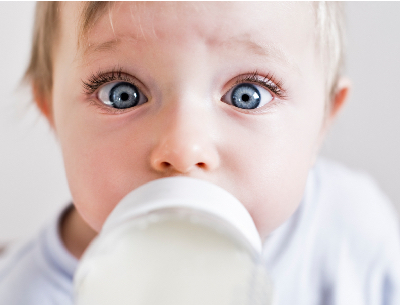Reverse infant milk allergies with probiotics
An estimated 2.5 percent of children under age 3 are allergic to cow’s milk. Overall, milk allergies are the most common food allergy for infants and small children, according to Food Allergy Research & Education (FARE).
Cow’s milk allergy symptoms can vary from mild to life-threatening, and should not be confused with lactose intolerance, a condition, while problematic, isn’t fatal.
Most young children eventually outgrow these allergies, according to FARE. Until then, medical experts recommend babies be fed hydrolyzed, casein-based formulas containing altered proteins that are easier and safer for their growing young systems. Moms must keep a vigilant eye on product labels to avoid milk-based ingredients too.
Concerns about milk allergies led scientists from the University of Chicago to find a safer treatment in probiotics, according to a study featured in The ISME Journal.
Researchers tested a probiotic formula containing the proprietary strain Lactobacillus rhamnosus GG (LGG) by analyzing and comparing stool samples taken from healthy infants who consumed the probiotic formula and babies given the formula without the probiotic.
Babies with cow’s milk allergies had significantly different compositions of gut bacteria compared to healthy children, which may have had an influence on their development.
Overall, babies whose bodies responded to the probiotic formula had higher amounts of gut bacteria when compared to children who didn’t, developed a similar tolerance.
This tolerance is connected to specific bacterial strains that produce butyrate, a byproduct of the metabolization of fiber providing nourishment for colon lining cells and linked to cancer-fighting benefits.
“The ability to identify bacterial strains that could be used as novel therapeutics for treating food allergies is a fundamental advance,” said Dr. Jack Gilbert, Associate Professor in the Department of Ecology & Evolution at the University of Chicago and co-author of the study, according to a press release.
Another probiotic formulation containing a proprietary strain of Lactobacillus rhamnosus was also responsible for providing a safe, long-term solution for treating peanut allergies earlier this year.
With all of this attention on probiotics, it may be just a matter of time before scientists test a non-proprietary strain of Lactobacillus rhamnosus like the kind contained in EndoMune Advanced Probiotic and EndoMune Junior to treat food allergies.
Despite the good news about probiotics treating infant food allergies, always consult with your doctor or pediatrician first so they can provide the proper course of action for your child’s specific health condition.
Reverse infant milk allergies with probiotics Read More »



 For some women, however, it doesn’t lessen
For some women, however, it doesn’t lessen 